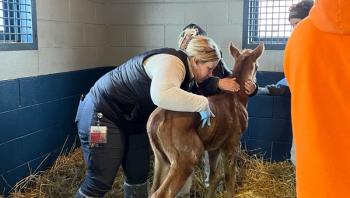
AAHA eyes spot checks to derail cheaters
Cleveland-The American Animal Hospital Association (AAHA) explores random hospital inspections in an effort to dissuade practitioners from cheating its accreditation system.
Cleveland-The American Animal Hospital Association (AAHA) explores random hospital inspections in an effort to dissuade practitioners from cheating its accreditation system.
The move comes on the heels of an AAHA accreditation overhaul implemented last August, in part, to keep fraud at a minimum. While AAHA officials insist those deceiving the standards make up a minimum of the 3,000 Canadian and U.S. hospitals certified, veterinarians tell of cheating colleagues in Veterinary Information Network chat rooms and interviews with DVM Newsmagazine. As stories of hospitals borrowing supplies, falsifying records and hiding expired drugs spread, many who value accreditation welcome surprise audits to maintain the integrity of the system.
"I'm heavily in favor of it," says Dr. Heather McCauley, owner of an accredited practice in Tarpon Springs, Fla. "I'm aware that there are veterinarians who hear of cheating and choose not to join the association, and I think that hurts AAHA. But if you're an AAHA member and you aren't cheating, I don't see how you would be against them just showing up on the doorstep. It would add so much credibility."
Gauging the storm
The likelihood of practitioners tolerating spot checks is what AAHA attempts to ascertain as its counterpart in human medicine, the Joint Commission on Accreditation of Healthcare Organizations, considers random audits for 2005. While practices have always received notice before audits every three years, the association now grants 90-day lead times so practices can adjust to new protocols that have more than doubled to total 829.
"It is possible that AAHA could implement routine unannounced evaluations, but not today," AAHA President Dr. Link Welborn says. "Only a minority make temporary changes just to pass the evaluations. Should we penalize all AAHA-accredited practices for a few bad apples? You've got to consider that these practices have an ongoing responsibility to patient care. An unannounced evaluation could substantially disrupt the quality of care on that day."
Dr. Link Welborn
AAHA fears financial hit?
Aside from inconvenience, critics claim the real roadblock to random audits is anticipated lost membership dollars from practices traditionally allowed to slide through the system. Accreditation is one of AAHA's chief roles, and most practices pay between $770 and $1,105 a year in dues along with a one-time $625 survey certification fee, the group says. While AAHA won't verify whether it's caught cheaters or release pass/fail rates, Welborn insists profits and membership numbers won't determine whether AAHA spot-checks facilities.
Veterinarians predict otherwise. Some practitioners already have a low tolerance for AAHA's high accreditation costs; added inconvenience could drive DVMs away, says Dr. Bill Folger, owner of an accredited feline specialty practice in Houston.
"In the long run, I think spot checks would have a negative impact on hospital membership in AAHA, and I think AAHA knows that," Folger says. "I'm all for it, but practices that store expired drugs in the trunks of cars the day of inspection would never appreciate it."
Neither would Dr. Doug Aspros, whose New York practice has been accredited since the late 1970s and likely wouldn't improve from unannounced inspections, he says.
"I think AAHA will be left with only the very high quality practices if they do random inspections," Aspros says. "To the extent that accreditation is a critical self-study, it's valuable, but obviously people can scam. Each time we have the AAHA inspection these days we wonder why we're spending the money to do it."
Raising the bar
Conversely, Dr. John Daugherty, a practice owner in Poland, Ohio, who forgoes accreditation, says spot checks would encourage him to join. Seeing practices "dummy up" records has held him back, he says.
"It's like the health department announcing to a restaurant that in two weeks we're going to check your kitchen," he says. "I don't know how much the accreditation means."
That's an understandable but skewed characterization of what's happening today, AAHA Accreditation Manager Debbie Gadomski says.
The revised accreditation guidelines implemented last August now focus on patient care rather than spotlighting facilities and equipment. Practices are not required to comply with all 829 standards but choices in 19 sections. And a practice's grade is determined at the site visit, nixing the old system, which allowed owners with violations 45 days to write compliance letters assuring AAHA members of changes that have been made. Now those who fail have six months to be re-evaluated at their own expense - a $575 fee, Gadomski says.
"There's always someone looking to beat the system, and we're only there every three years, so it's kind of hard to keep people from cheating," she says. "But part of me hopes that it's just too hard to cheat now. It was one of the reasons I was in favor of going with this new system."
Joining the team
Dr. Mike Thomas, AAHA past president and owner of seven accredited practices in Indiana, shares Gadomski's enthusiasm concerning the new protocols but says random audits could secure the system.
Dr. Mike Thomas
"There are people who are going to cheat, and we can't check their integrity every week," he says. "But putting the fear of spot checking in people's minds might be possible, even if being there all the time isn't economically feasible."
Considering AAHA's changes, Daugherty says he'll likely join the 15 percent of U.S. veterinary practices currently boasting accreditation. That doesn't mean he's less ardent about the need for random inspections.
"The standards have changed, and that's a good thing," he says. "But they can't assure there won't be cheating unless they look over your shoulder when you're not expecting them. If they really want to make sure people meet the standards, AAHA will look closer at its practices."
Newsletter
From exam room tips to practice management insights, get trusted veterinary news delivered straight to your inbox—subscribe to dvm360.






